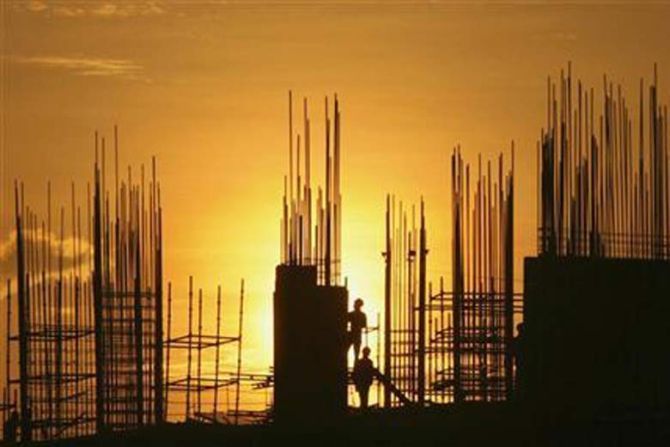'Our stable outlook currently points to the fact that the ratings are likely to remain stable for the next couple of years.'

Vulnerabilities on account of low gross domestic product per capita and high government debt counterbalance the robust GDP growth, S&P Global Ratings Director Ravi Bhatia, bottom, left, tells Dilasha Seth.
The S&P report forecasts robust economic growth, rise in forex reserves with limited fiscal risks. Yet, the rating has been maintained at BBB- with a stable outlook. Why?
The ratings on India reflect the country's strong gross domestic product growth, sound external profile, and improving monetary credibility.
India's strong democratic institutions also support the ratings.
This is counterbalanced by vulnerabilities stemming from the country's low GDP per capita and relatively high net (net of liquid assets) general government debt stock.
Do you see scope for a ratings upgrade next year or the year after?
Our stable outlook currently points to the fact that the ratings are likely to remain stable for the next couple of years.
What more reforms do you expect from the government to merit a ratings upgrade?
 India's reform momentum has been quite strong and has broadly assisted the growth story, barring some relatively short-term implementation problems.
India's reform momentum has been quite strong and has broadly assisted the growth story, barring some relatively short-term implementation problems.
With the government in a seemingly difficult fiscal position, should it slow the fiscal glide path, as indicated by Finance Minister Arun Jaitley in his address in Singapore recently?
We don't give policy advice, for example on whether to embark on a fiscal stimulus, etc.
What impact do you foresee on India's fiscal deficit due to GST?
Although there are some short-term implementation issues, over time, GST should help widen the tax net and increase government revenues.
We have to see where the tax bands will settle.
Are you suggesting in the report that there is a strong case of the Bharatiya Janata Party winning the Gujarat elections?
No comment on Gujarat specifically. But, overall, we view India's democratic federal institutional framework as quite strong, with sound checks and balances.
Do you think the NPA (non-performing asset) problem will be resolved after the bank recapitalisation programme?
The plan should assist the NPA problem. I am not sure it will be resolved.
Do you expect private investment to revive in the coming year?
The bank recapitalisation plan should help somewhat, but on the demand side, demand for credit remains lax.
The current GST structure has been criticised for being far removed from what was conceived. Do you think the efficiency gains everyone hopes for will materialise?
In the medium term, it should provide some gains to both GDP and the tax take; the size of its overall impact remains unclear.
Was the government kept in the loop about the ratings before the official release?
We conduct meetings on an ongoing and routine basis with rated issuers, including discussions at several levels with the governments we rate, such as India.
We do not comment on these discussions.
Photograph: Krishnendu Halder/Reuters











